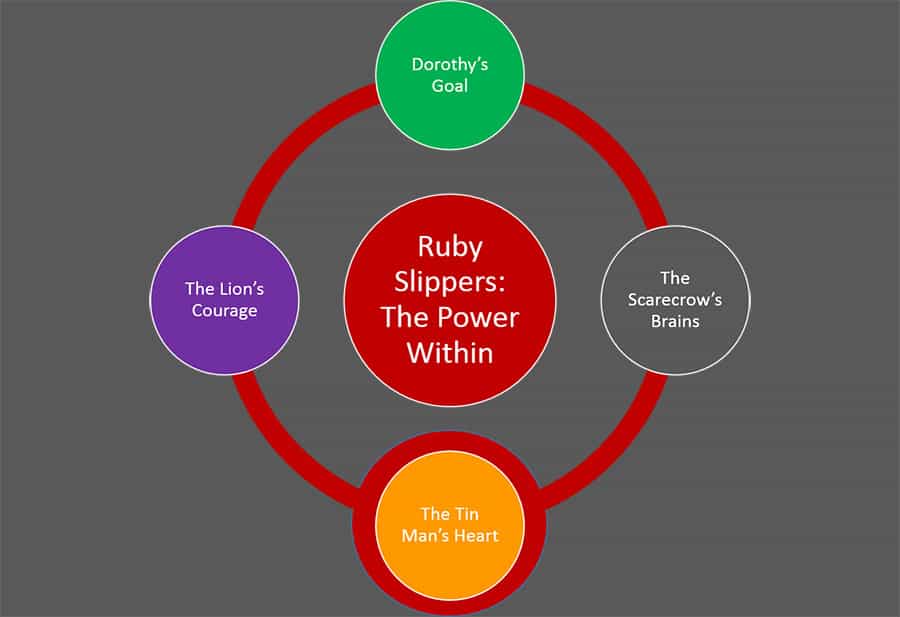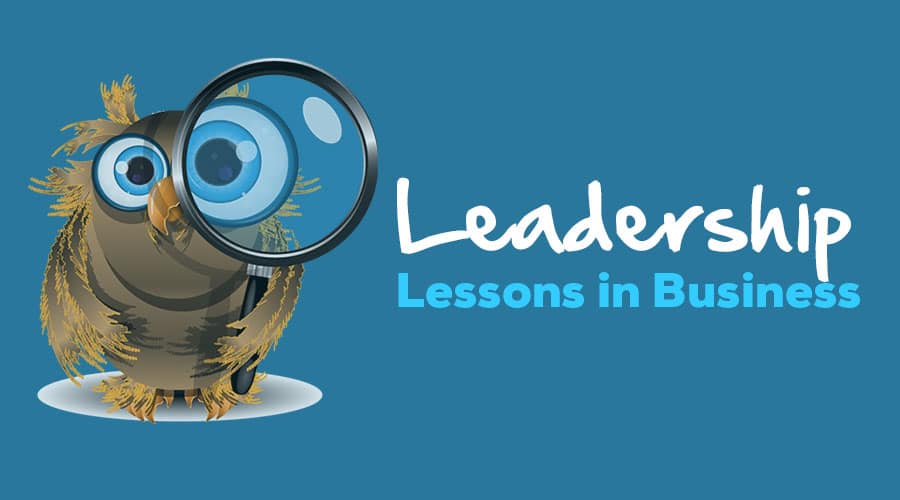The Tin Man’s Heart: Leadership Lessons from the Wizard of Oz

When students of leadership consider the key attributes of top business leaders today it would be unusual for any student to initially characterize any top leader in terms of how much compassion they have for their followers. In a December 2012 Forbes Magazine article listing the top ten qualities of a great leader, compassion or any related synonym for compassion was absent from the list (Forbes.com LLC, 2014).
However, compassion and authenticity are traits most often associated with the heart of a leader (Tan, 2012). Authentic, compassionate leaders, those with so-called ‘heart’ often achieve success through their ability to motivate and inspire their followers to high performance levels.
As we delve in to better understand the underlying personal characteristics of heart-centered leaders we learn that these “leaders not only need to share their ideas, but also how they feel about the ideas in a way that ultimately shows their own vulnerability…[To] stand before [their] followers, asking for their support, is an act of courage, heart and thoughtfulness. This means that having heart is the pinnacle of susceptibility for any leader. It is the exhilaration of possibility and the reality of exposure to criticism all bundled together. But it’s not just emotions that followers want to see. They want to see the real you – not just the pulse of your being” (Fickenscher, 2013, Loc. 586-592).
L. Frank Baum, the author of the book, “The Wonderful Wizard of Oz,” was a role model for compassion and empathy enabled through his own personal experience with pain and suffering. We observe this with each of the main characters in the Wizard of Oz as an outcome of their own experience with adversity. What did the Tin Man teach us? “Express how you feel, have compassion, and others will follow…leaders need to lead with heart as well as thought and courage, along with all of the other elements of leadership…so if you want to be a leader, recognize that having heart, more importantly, sharing heart – creates a reason for others to follow you. If your passion is felt out in the open, followers will not only follow, but they will carve pathways through forests for you…creating passion about our ideas – or having heart – shows that we care about changing the world and making a difference…We need to have heart to create heart. And we create heart by developing our disciples” (Fickenscher, 2013, Loc. 647-659).
Leaders with heart encourage the heart of their followers with words, “You can do it” or “We will succeed” or “We will not fail”. This encouragement helps to reduce stress and increases productivity (Business-leadership-qualities.com, 2014). A pivotal scene in the movie demonstrates the heart of the leader when Dorothy says to her team, “There’s the Emerald City! Oh, we’re almost there at last! At last! It’s beautiful, isn’t it? Just like I knew it would be.” Her enthusiasm is infectious and the Lion says, “Well, come on, then. What are we waiting for?” The Scarecrow replies, “Nothing! Let’s hurry!” Dorothy responds, “Yes, let’s run!” As they begin to run, the Scarecrow yells, “Come on, come on” and the Tin Man encourages the group, “Hurry, hurry” and the four of them have increase their speed and with it, their optimism to ultimately succeed in their quest (Screenplays for you, 2014).
Having heart as a leader means shedding the exterior image that can be perceived as cold, hard metal with a hollow, empty interior. Having heart as a leader means opening up to people, sharing how you feel, and sharing your passion about your ideas. Having heart as a leader means listening to your followers, hearing their ideas, and understanding the source of the passion being conveyed to you as their leader.
Having heart as a leader means standing up for your principles, your values, and what you believe is right. Heart centered leadership is about “leaders who realize that self-care and authenticity have a deeply significant impact on the satisfaction and well-being of their workforce and, by extension, the bottom line” (Heart Centered Leadership, 2014).
Leaders with the capability to expose their inner self, expose their vulnerabilities have the potential of “creating emotionally engaged, tuned in employees who are highly motivated to want to do their best work for you…creating a workplace that attracts – and keeps – the best and the brightest…keeping customers and clients satisfied and using your products and services consistently” (Heart Centered Leadership, 2014).
“Putting your people first is to treat them with empathy and compassion. Acquire a love for people. In reality, we do not lead organizations or businesses. No. We lead people. We are successful if we know how to lead people. People are the name of the game and the best way to become a leader is to love people. Your people can tell instinctively whether or not you have their best interests at heart. If they feel you don’t care for them, they will not follow. Leadership is the art of directing people we care for to achieve a common desired goal” (Brandstorm, 2014). Some specific examples of how leaders can lead with their heart:
- Connect work to a mission, for example, to journey to Oz and meet with the Wizard
- Connect to your co-workers – build strong relationships through a shared experience on the journey
- Leave no employee behind – inviting people to participate to achieve your shared goals
- Insist on work/life balance – such as taking time for self-care and grooming before meeting the Wizard of Oz for the first time (“pat, pat, here, pat, pat there, and a couple of brand new straws. That’s how we keep you young and fair in the merry old land of Oz”)
- Share the wealth (the success)
- Have more fun – happy employees are more productive and singing along journey is fun (“We’re off to see the wizard, the wonderful wizard of Oz”)
- Believe in the power of each person – one person can make all the difference (Atlanta Journal-Constitution, 2014).
“Our heart is that place inside us that defines who we are, what we believe, how we decide and which direction we take others. It is where wisdom is birthed and the ability to enjoy life begins. Our heart is where our deepest passions reside and most meaningful dreams originate. Our best performance tends to flow from the heart” (Authentic Leadership Inc., 2014). The traits and characteristics of heart-centered leadership are most closely aligned with ethical leadership theories and specifically, authentic leadership.
“Authentic leaders have positive core values such as honesty, altruism, kindness, fairness, accountability, and optimism. These core values motivate authentic leaders to do what is right and fair for followers, and to create a special type of relationship that includes high mutual trust, transparency (open and honest communication), guidance toward worthy shared objectives, and emphasis on follower welfare and development. The self-concepts and self-identities of authentic leaders are strong, clear, stable, and consistent. These leaders have a high self-awareness about their values, beliefs, emotions, self-identities, and abilities. In other words, they know who they are and what they believe. They also have a high degree of self-acceptance, which is similar to emotional maturity” (Yukl, 2013, p. 351).
———————————–
This article, the fifth in a five-part series published by CEOWorld Magazine, examines leadership through the lens of L. Frank Baum’s ‘The Wonderful Wizard of Oz’. The author, Jonathan Stutz, believes a leader’s success is dependent upon a belief in oneself, having a goal for a better future, wisdom, emotional intelligence, and a willingness to take action. Throughout this series you will learn that developing these combined capabilities is a journey, a road filled with difficulties and obstacles. Stutz’s insights demonstrate that Baum’s fantasy provides a platform for leaders to reflect and gain perspective on their own journey down the yellow brick road of leadership.
- Courage: Leadership Lessons from the Wizard of Oz
- Ruby Slippers: Leadership Lessons from the Wizard of Oz
- Dorothy’s Goal: Leadership Lessons from the Wizard of Oz
- The Scarecrow’s Brains: Leadership Lessons from the Wizard of Oz
- The Tin Man’s Heart: Leadership Lessons from the Wizard of Oz
By, Jonathan Stutz is a Policy Director at the Microsoft Corporation leading a team in the Trustworthy Computing group (www.microsoft.com/twc). His 18 year career at Microsoft has encompassed Human Resources, Cultural Diversity and Inclusion, Global Readiness, Training, Community Building, Business Development, and Business Operations. Jonathan earned his B.A. in Political Science from the University of Washington (Seattle) and his M.A. in Leadership from City University of Seattle. Jonathan and his wife live in Bellevue, WA, a suburb of Seattle where he is an avid runner and hiker. You can contact Jonathan on Twitter @jmstutz
References:
Atlanta Journal-Constitution (2014). 7 ways to lead with your heart, by Peter Economy.
Authentic Leadership, Inc. (2014). Leadership of the heart training: the pursuit of authentic leadership.
Brandstorm (2014). Leadership lessons from the Wizard of Oz.
Business-leadership-qualities.com (2014). Leadership behavior – encourage the heart. Retrieved on 15 February 2014.
Fickenscher, K. (2013). Toto’s reflections: the leadership lessons from the Wizard of Oz. Parker, CO: Outskirts Press, Inc., Kindle version.
Forbes.com LLC (2014). Top 10 qualities that make a great leader by Tanya Prive.
Heart Centered Leadership (2014). Heart centered leadership: lead well, live well. Retrieved on 22 February 2014.
Screenplays for you (2014). Wizard of Oz, the movie script. Retrieved on 10 September 2013.
Tan, C-M (2012). Search inside yourself: the unexpected path to achieving success, happiness (and world peace). New York, NY: HarperCollins Publishers.
Yukl, G. (2013). Leadership in organizations, 8th Edition. Upper Saddle River, New Jersey: Pearson Education, Inc.
—————————–
I would love to hear from you on your thoughts or interest in this topic.
For more columns, thoughts and opinions, follow CEOWORLD magazine on Twitter @ceoworld.
Bring the best of the CEOWORLD magazine's global journalism to audiences in the United States and around the world. - Add CEOWORLD magazine to your Google News feed.
Follow CEOWORLD magazine headlines on: Google News, LinkedIn, Twitter, and Facebook.
Copyright 2025 The CEOWORLD magazine. All rights reserved. This material (and any extract from it) must not be copied, redistributed or placed on any website, without CEOWORLD magazine' prior written consent. For media queries, please contact: info@ceoworld.biz










